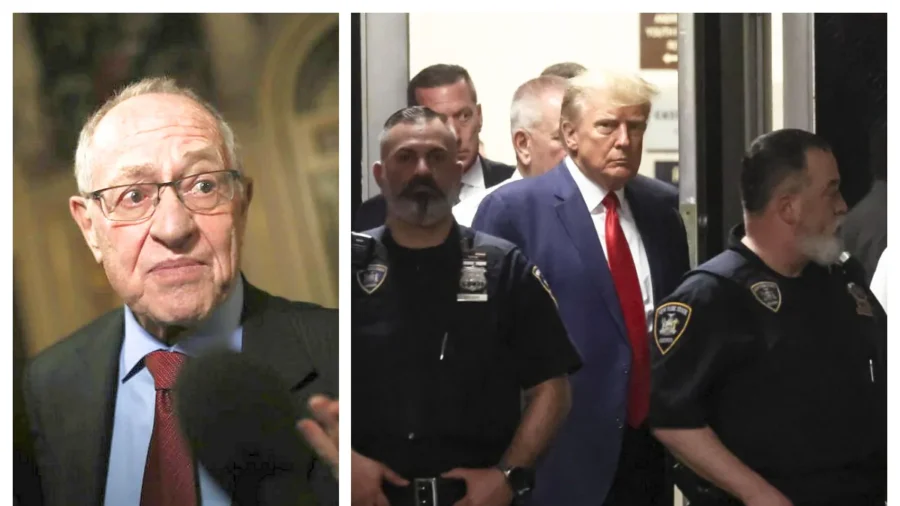Retired Harvard Law professor Alan Dershowitz said last week that he believes the prosecutor who brought the New York criminal case against former President Donald Trump should instead be investigated.
In a social media post late last week, Mr. Dershowitz said that a “major [issue]” in the case is how prosecutors will have to prove to the jury that payments President Trump sent to a former associate and lawyer, Michael Cohen, are actually illegal. In the case, prosecutors alleged that President Trump allegedly initiated a reimbursement plan for Mr. Cohen so he could pay an adult film performer to remain silent about an alleged affair the former president has denied.
“The only justification for paying the money is avoid a lawsuit,” the retired professor said, adding that if he made those payments to “avoid exposure” and “publicity,” it’s “extortion, and he’s then the victim of a serious crime.”
“The only way it’s not extortion is if the money was paid to avoid a lawsuit, and if the money was paid to avoid a lawsuit, it’s a legal expense,” Mr. Dershowitz said.
Describing the case as a “fabrication of a crime” against the former president, Mr. Dershowitz added on social media that Manhattan District Attorney Alvin Bragg “made up a crime” and used a “witness” who he knew “could not tell the truth,” referring to Mr. Cohen. “There are so many ethical violations” at play, he added.
The Epoch Times contacted the district attorney’s office for comment.
Last week, prosecutors and defense attorneys rested their respective cases in the trial, which has lasted more than six weeks. The judge, Juan Merchan, then said that the jury should return on Tuesday, the day after Memorial Day, to listen to closing arguments in the case.
Earlier this month, meanwhile, Mr. Cohen had testified that he believes President Trump directed him to make the payments to the adult film performer and did so to influence the outcome of the 2016 election, concurring with prosecutors’ arguments.
The former president’s lawyers called up Robert Costello, a former legal advisor to Mr. Cohen, who testified that he told him in 2018 that President Trump wasn’t at all involved in the payment plan.
Attorneys for the former president did not call him up to testify in the trial, which is a common phenomenon in criminal cases. The former president told a local ABC affiliate station that he didn’t take the stand because of the judge’s rulings.
“He made rulings that makes it very difficult to testify,” President Trump told the station. “Anything I did, anything I did in the past, they can bring everything up, and you know what, I’ve had a great past—but anything.”
The other reason he didn’t take the stand, he added, is “because they have no case” before he asked: “Why testify when they have no case?”
It comes as a New York appeals court last week denied former President Donald Trump’s bid to have Judge Juan Merchan recuse himself in his Manhattan criminal case—six weeks after it was filed.
In mid-April, the former president’s legal team sought Judge Merchan’s recusal because his daughter works for a consulting firm for Democratic Party candidates. At the onset of the trial, which started around the same time, Judge Merchan told the court that he wouldn’t consider their recusal bid until the state appeals court issues a decision.
A panel of appeals court judges, on May 23, wrote that the former president did not provide enough evidence to show that Judge Merchan overstepped his authority.
“Petitioner has failed to establish that the court acted in excess of its jurisdiction by denying his motion,” the order said. “Petitioner also has not established that he has a clear right to recusal.”
Throughout the trial, President Trump has been subjected to a gag order, prohibiting him from commenting on prosecutors’ staffers, witnesses, court staff, and Judge Merchan’s family. He’s repeatedly been critical of the judge, saying that he is conflicted and biased.
Judge Merchan has said he expects closings to take a full day, maybe longer. After that, he said, he’ll instruct jurors in the law for about an hour before sending them to deliberate. He said that could happen as early as next Wednesday.
Closings, sometimes also known as summations, are the last opportunity for each side to go over the case and attempt to persuade the jury to acquit or convict.
Assistant District Attorney Joshua Steinglass is slated to give the prosecution’s closing and is likely to highlight portions of the evidence and testimony that it sees as supporting its case. The defense is likely to remind jurors of the inconsistencies and credibility issues it sees in many of the prosecution’s key witnesses, while also underscoring President Trump’s insistence that he is innocent.
The Associated Press contributed to this report.
From The Epoch Times

